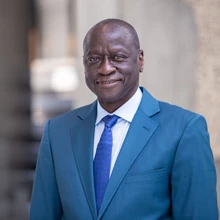 A panorama shot of cityscape of Lagos Island, Nigeria at sunset. Credit: Bassey - stock.adobe.com
A panorama shot of cityscape of Lagos Island, Nigeria at sunset. Credit: Bassey - stock.adobe.com
Each visit to Nigeria reaffirms my admiration for the nation’s dynamic energy and the unyielding spirit of its people, which is deeply embedded in their culture, arts, entrepreneurial activities, and industrial sectors. Nigeria’s potential to emerge as a leading economic powerhouse in Africa is rooted in the hardworking ethos of its citizens, who have proven their excellence both locally and internationally. Currently, Nigeria is at a decisive moment, with the opportunity to stabilize its economy and drive sustainable, inclusive growth for all its citizens.
The recent macroeconomic reforms reflect Nigeria’s determination to improve its economic outlook and expand its economy. The home-grown policy to work towards eliminating gasoline subsidies is expected to generate fiscal room, redirecting funds toward vital investments in human capital and infrastructure. Likewise, the unification of exchange rates enhances revenues, reduces market distortions and ends the previous suffocating effect of opaquely priced, rationed foreign exchange on investment and business activity.
Nevertheless, these essential reforms come with their own set of challenges, especially for the poorest and most vulnerable groups. Despite being critical for Nigeria’s economic stability, these measures have necessitated significant adjustments: gasoline prices have more than tripled, and the naira has depreciated by around 69% against the US dollar in the official market. Consequently, inflation has significantly increased, reaching 33.7% year-on-year in April 2024. These economic shifts have disproportionately impacted the poorest households, who are already contending with a high cost of living.
The current priority is to alleviate these effects while continuing the momentum of reforms to secure lasting advantages for all Nigerians. This moment presents a chance to establish a new social contract between the government and its citizens. In response, the government is implementing a cash transfer program, which aims to provide financial assistance to 15 million households affected by the price hikes. This significant move, however, needs to be scaled up and support must be delivered promptly and efficiently to those most in need.
It is crucial that the pressures on living costs, brought about by these reforms, are offset by initiatives that enhance access to basic services, thereby improving citizens’ quality of life, generating employment, and increasing investments in areas such as education and healthcare. Initiatives like the Adolescent Girls Initiative for Learning and Empowerment, which has enabled over 1.6 million adolescent girls to attend secondary school through the construction and renovation of educational facilities, are commendable and requires further emphasis and expansion.
In this endeavor, the private sector is positioned to play a key role in mobilizing investments and developing essential infrastructure, particularly in improving electricity access and digital connectivity. Such investments are expected to create jobs and enhance productivity. However, an appropriate policy and regulatory framework is essential to facilitate private sector investments.
The World Bank continues to be a dedicated ally in Nigeria’s reformative path, offering extensive financial and technical support with investments surpassing $15 billion in various sectors, including clean energy, education, climate adaptation, and governance. Recently, we have unveiled a $2.25 billion financing package that includes immediate financial and technical support to stabilize the economy and expand assistance to vulnerable households. By reducing Nigeria’s reliance on fluctuating oil prices and boosting non-oil revenue, we hope that Nigeria will be able to sustainably increase its spending to meet its significant developmental needs. The enhancement of the national social protection system, through the establishment of the social registry, will strengthen the nation’s social protection programs and equip the government to respond swiftly to future economic shocks.
As Nigeria advances on this path, it will need the collective support of all stakeholders, including the private sector and the citizenry. The vision of Nigeria turning the corner and realizing shared prosperity for its people is within reach.
This blog was initially published on This Day Nigeria.


Join the Conversation